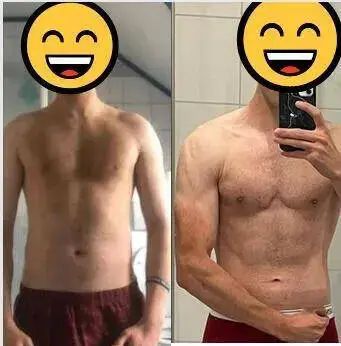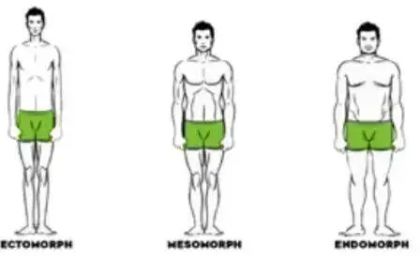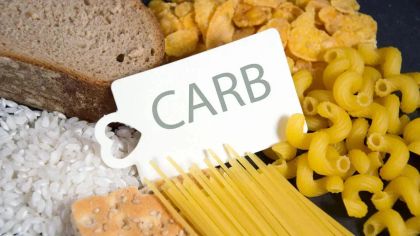Every few years there's a different type of food or nutrient getting demonized. Right now, carbohydrates get the beating. The popularity of diets like Keto or Carnivore is soaring. But is it actually true that carbs cause the obesity epidemic?
Should you avoid them if you want to reach your dream physique? Or should you keep them in your diet? The truth is, Keto and low-carb diets work great - for some. For others, they're terrible. So how do you know if you should eat carbs or not? And how many?
That’s what you’ll learn in this newsletter! We’ll cover the downsides of cutting carbs, who’d benefit from a low-carb approach, who not, and much more. Keep reading if you want to maximize your energy, reach your ideal physique sustainably, and get rid of brain fog. And all while maximizing enjoyment.
There are five major problems with eliminating carbs:
1 – Lack of energy
You wouldn’t expect a Ferrari to go fast without fuel, right? That’s what carbs are for your body: An easily and quickly available source of energy. While some people’s metabolism is fine relying on fat for energy, yours may not. You’ll realize this if your energy crashes mid-day or if you lack the power to train. If that’s your experience, there’s no point in avoiding carbs.
On top, you might also experience more stress and difficulties to recover: Carbs stimulate the production of serotonin, which helps regulate mood and promotes a sense of calm and well-being. Serotonin also counteracts some of the stress responses triggered by cortisol (a stress hormone). This also matters for your sleep, as you will learn later on.
2 – Lack of nutrients
Carbs aren’t essential for the body, meaning the body can survive without them. Yet, many micronutrients contained in carb-rich foods, such as fruit, are essential. If you decide to go Keto, or, worse, Carnivore, it might lead to micronutrient deficiencies and you need to consider additional supplementation.
Also, consider the importance of fiber: Fiber is a carbohydrate found in plant foods, such as beans, fruit, grains, nuts, and vegetables. Recommendations for fiber are 25g for women and 38g for men. Diets that heavily restrict carbs (like Keto, with less than 50 grams per day to maintain ketosis) might lead to fiber deficiency.
While you'll hear claims that fiber destroys your gut, scientific data shows the opposite. Increasing fiber intake is shown to improve:
- Satiation
- Gut health
- Cardiovascular health
- Risk of all-cause mortality
- Blood-sugar management
If you have digestive issues with specific sources of fiber, look for other ones that are more digestible for you. The only valid reason to cut fiber is being diagnosed with a condition that prohibits high fiber consumption. Make sure to get professional counseling before you decide to cut fiber and don’t make that decision based on social media trends.
3 – Lack of enjoyment
This is a big one. Some people love to cover their food intake through meats and fatty foods. You might not. Compliance is king, especially when you’re trying to lose weight. If you can’t imagine life without fruit, for example, you’ll struggle with a plan that restricts carbs. Demonizing certain foods or nutrients can distort your relationship with food. This will sabotage your weight-loss efforts or, in the worst case, lead to eating disorders. No diet will work for you if you can’t stick to it long-term. Don't force yourself on diets you hate and create room for your favorites in your meal plan.
4 – Lack of priority
Fats won’t make you fat. Carbs won’t make you fat. Excess will make you fat. You won’t automatically lose weight by avoiding carbs. The truth is, caloric balance will determine whether you lose or gain weight. Fat has the highest calorie density of any macronutrient, and you can overeat – even if you eliminate all carbs.
Remember that the Keto diet is not an all-fat-you-can-eat diet (even though it’s often sold that way). You still have to consider energy balance. Click HERE to learn how to nail this, without having to count calories or hop on restrictive diets.
5 – Lack of flexibility
Depending on your lifestyle, it can be impossible to avoid carbs completely: If you have a social life, it will also be challenging for you to avoid carbs completely. Most restaurant meals usually contain carbs and you’ll have to restrict them heavily to stay carb-free. This can cause extra stress and impair your quality of life. You know by now that without compliance, you won't reach your goal. Make sure to establish an eating routine that improves your life, not takes from it. Otherwise, you’ll be part of the 95% of "dieters" who regain their weight within 1-5 years.
To summarize:
Avoiding carbs isn't a good idea if you:
- Don’t perform well on fats
- Want to build more muscle
- Have to sacrifice your favorite foods to do so
- Need the flexibility to consume carbs in your diet
- Experience higher amounts of stress and lower energy without carbs
Let’s take my client Noah as an example:

All his favorite foods are high in carbs, such as pasta. He owns a recruiting agency, has a 60 hour + workload, and deals with a lot of stress. While his main goal was to cut belly fat, he also wanted to build muscle long-term. That’s why he decided to train four times per week and did cardio on top.
If I forced him into Keto, it would have been a disaster: He would have hated it, his energy would have plummeted, and his workouts would have sucked.
The truth is that there’s no perfect amount of carbs to eat for everyone.
As always, the ideal is individual. Now we will go into some simple guidelines you can follow to optimize carb intake.
1 - Body type
Keto or low-carb diets tend to work well for fast oxidizers. A fast oxidizer is someone who can metabolize food into energy quickly. That’s you if eating a lot of carbs makes you more tired, less focused, and feeling unwell. The model of “body types” can help you estimate whether a low- or higher-carb diet will work better for you:

Image source: Clean Health Institute
Endomorphs tend to do better on low-carb diets (20% or less of your total calories covered through carbs). Ectomorphs and Mesomorphs usually need more carbs. Also, consider your goal and your starting point: If you want to lose a significant amount of weight, it makes a lot of sense to reduce carbs for at least 3 months. This will help you restore insulin sensitivity, which is often impaired in obese individuals.
2 - Daily Activity
You might have heard the saying “Earn your carbs!” Higher activity usually demands higher carbs. This matters especially if you do strength training (which you should): Carbs are important after a hard workout to help you mitigate cortisol and help you recover. You’ll also be stronger during your training.
If you’ve noticed that you do better on a low-carb diet, increase carb intake on days you work out.
3 – Timing
No, you won’t automatically get fat because you eat at the wrong time. Still, the timing of when you eat your carbs does matter. Eat most of your carbs around your workout. That way, you’re putting the energy to its best use. Contrary to the myth that carbs after 6 pm will make you fat, eating carbs late can be beneficial. Night-time carbs help you fall asleep by lowering cortisol and increasing serotonin. Serotonin converts to melatonin, which plays a key role in sleep.
Planning your carbs later in the day can also help you to integrate your diet into your lifestyle. This is especially valuable if you have a family.
4 – Focus on a lower glycemic load
That way, you can stabilize your blood sugar levels. Blood sugar management is important for overall health and well-being. You will experience higher energy, lower brain fog, and fewer hunger attacks that way. To do so, focus on carb-rich foods with a lower glycemic index (GI). GI measures the relative impact on blood sugar levels of a given carb source against pure glucose. You can find the GI values of certain foods HERE.
Glycemic load is calculated by multiplying the glycemic index of a carb source by the number of grams of carbs in that source, then dividing by 100. The higher the load, the more blood sugar we should expect to see.
For example, an apple with a GI of 40 and a carb count of 16 grams would have a glycemic load of 6.4 GL. A GL below 10 is considered low, 11 and 19 is considered medium and a glycemic load above 20 is considered high. If you eat higher GL meals, do so around your workout as insulin sensitivity is better at that time.
5 – Lifestyle & psychological factors
If your absolute favorite foods contain carbs, create space for them in your diet, even if the low-carb approach fits your situation. That way, you make the process more enjoyable. Remember that compliance is king if you want to see lasting results. Plan ahead for occurrences like social events where you’re likely to eat more carbs. That way you can maximize enjoyment and success.
Recap:
- Keto and very low-carb diets don't work for everyone.
- Don’t listen to people who tell you that you cannot lose weight unless you cut carbs – it’s B.S.
- Specific diets are tools to help you get in shape and there’s no diet that fits everyone.
- Utilize the one that fits your individual situation and your body.
- Finding the best amount of carbs for you requires experimentation and great self-awareness.
- If you’re obese, it makes sense to reduce carbs, at least for a few months.
- Eating carbs later in the day will not make you fat. In fact, it can be beneficial for the sake of falling asleep easier, stress management, and social life.
- The harder you train, the more you tend to struggle with a low-carb approach.
- Consume carbs around your workout to make the best out of them and recover faster.
- Stick to foods with a lower GI during the day for blood sugar management.
If you want personalized help to achieve your fitness goals much faster, click HERE for a free 1:1 strategy call.
Disclaimer: This is no nutritional counseling or health advice.
